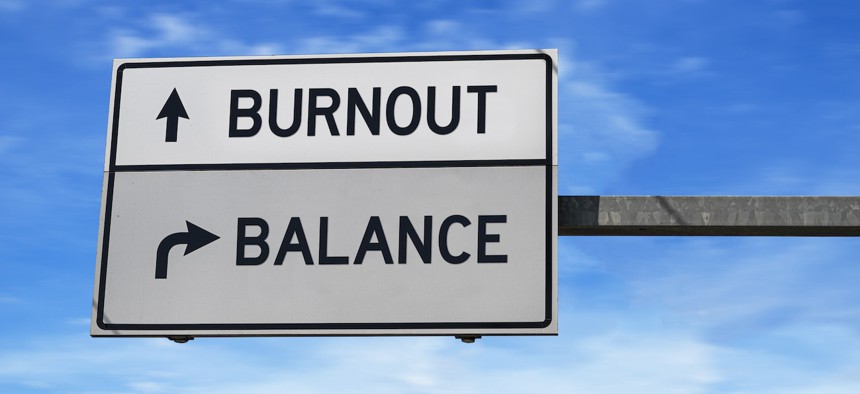
Maria Vonotna/Getty Images
Public-sector workers report taking fewer and fewer vacation days
Not being able to unplug from work leads to burnout and poor performance, one expert reminds us.
For many feds, holiday season 2023 is shaping up to be less “Home Alone”—where all but one member of the family takes a fun, faraway vacation—and more like “A Christmas Carol,” a quick and grudging single day off from a Dickensian world, offering barely enough time to empty your stocking.
In fact, more than a quarter of all government workers surveyed—at the federal, local and state levels—report they had not taken even one vacation over the previous year.
The survey results, by Eagle Hill consulting and released days ago, reveal a huge chunk of the public-sector workforce is overworked. Or, at the very least, lacking in downtime. It’s leading to burnout, according to the researchers behind the survey.
“Worker burnout is a big problem across both the public and private sector,” Melissa Jezior, president and CEO of Eagle Hill, told Government Executive. “When workers are burned out, they can’t perform at their peak level.”
“And burnout can be dangerous for the many government public safety workers and their communities – from firefighters to nurses to air traffic controllers,” she added. A recent investigation of fatigue and related problems among the FAA’s air traffic control staff, conducted by The New York Times, attests to this.
Fully 40% of the public-sector workforce reported “that one of the biggest reasons they don’t take a fully unplugged vacation is the pressure they put on themselves to stay on top of their work,” Jezior said. About a quarter of employees cited staffing shortages as another factor in foregoing days off. Nearly a fifth cited pressure from their managers as an “impediment” to taking a vacation.
The survey, which breaks out some of the data by age and income cohorts, shows that lower-income employees are even more likely to have not taken at least one break (39% of modest earners vs. 26% of all earners in the survey sample.)
“It’s essential that government leaders understand burnout levels and causes, and also create a ‘take a break’ culture,” Jezior noted. “That means [management that should be] encouraging workers to take time off—unplugged time off—so they can rest and recharge. Leaders also need to set an example by taking time off too.”
Having said all that, as regards the end-of-year holiday season, there are additional factors preventing public-sector employees from basking in the downtime that they might—on paper—be entitled to.
“Taking vacations during ‘traditional’ days off is really challenging in the public sector,” Jezior said, breaking out a list of vacation-impaired public servants that leads with feds. “For example, the winter holidays are one of the busiest times of the year for air traffic controllers. And summer vacation time often is busy for public safety officials dealing with crowds, weather, and traffic."
For more on the survey, start here or go directly to the full results here.
NEXT STORY: Last-minute Open Season advice






